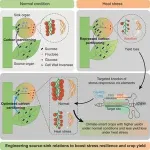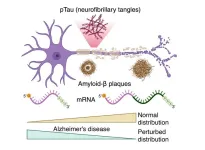(Press-News.org)
A recent study has reported a novel breeding strategy to rapidly create climate-smart crops that show higher yield under normal conditions and greatly rescue yield losses under heat stress both in staple grain and vegetable crops.
The study, which was published in Cell on 13 December, was conducted by Prof. XU Cao’s team from the Institute of Genetics and Developmental Biology (IGDB) of the Chinese Academy of Sciences.
The year 2050 is fast approaching and farm productivity must increase by 60% in order to feed a projected global population of 10 billion. However, current crop production is insufficient and is expected to worsen due to the abiotic-stress burden of climate change.
An increase of 2 °C during the growing season will result in a yield loss of 3–13%. To ensure global food security and overcome breeding bottlenecks, scientists urgently need to develop “climate-smart” crops that achieve higher yields under normal conditions and stable yields under heat stress.
The physiological basis of crop yield and quality is the source-sink relationship. Source tissues (e.g., leaves) are net producers of photoassimilates—i.e., primarily carbohydrates such as sucrose. In contrast, sink tissues (e.g., fruits, seeds, roots, developing flowers, cotton fibers, and storage organs) are net importers, which use or store photoassimilates.
The cell wall invertase gene (CWIN) is the crucial gene regulating the source-sink relationship in plants. The enzyme encoded by this gene unloads and converts sucrose transported from leaves into glucose and fructose within sink organs, where these sugars can be directly absorbed and utilized. These sugars are not only essential nutrients for the development of fruits and seeds, but significantly influence the sweetness of fruits and the quality of rice grains.
Heat stress represses CWIN activity and thus disrupts the source-sink balance, resulting in inadequate energy supply in sink organs, reduced reproductive development, and yield penalties.
In their new study, Prof. XU Cao and his team developed a strategy based on climate-responsive optimization of carbon partitioning to sinks (CROCS) by rationally manipulating the expression of CWIN genes in fruit and cereal crops. They precisely knocked-in a 10-bp heat-shock element (HSE) into promoters of CWIN genes in elite rice and tomato cultivars, using self-developed high-efficiency, prime-editing tools. HSE insertion endows CWINs with heat-responsive upregulation in both controlled and field environments to enhance carbon partitioning to rice grains and tomato fruits.
Multi-location and multi-season yield tests on tomatoes under various cultivation conditions including greenhouses and open fields showed that under normal conditions, the CROCS strategy increased tomato yields by 14% to 47%. Under heat stress, it increased per-plot fruit yield by 26%~33% over controls and rescued 56.4%~100% of fruit yield losses caused by heat stress. Notably, aspects of fruit quality such as uniformity and sugar content were significantly improved compared to unmodified controls.
In addition, rice cultivars improved by this strategy not only showed a yield increase of 7% to 13% under normal conditions, but also showed a 25% grain yield increase over controls under heat-stress conditions. Specifically, up to 41% of heat-induced grain losses were rescued in rice.
Prof. Xu noted that CROCS is an efficient, versatile, prime-editing based system for rapid crop improvement, which paves the way to rapidly create climate-smart crops by targeted insertion of environment-responsive cis-regulatory elements. The strategy also provides effective gene-editing tools and feasible operational procedures for the fundamental study of plant responses to stress.
The researchers also noted that this breeding strategy has now also been applied to crops such as soybeans, wheat, and corn.
END
Led by researchers from the University of Oxford’s Leverhulme Centre for Demographic Science and the University of Iceland, the review explores how genetic variations can explain differences in reproductive health and longevity.
The study provides the most comprehensive review of male and female genetic discoveries of reproductive traits to date, and provides new insights into how our DNA affects when we have children, the timing of menopause, and even how that is connected to how long we live.
Genes at the heart of reproduction
Using the GWAS Catalog, an online database of Genome Wide Association Studies (GWAS), the researchers identified ...
Wildfire smoke has long been known to exacerbate health problems like heart disease, lung conditions, and asthma, but now a new study finds that smoke from these fires can lead to poor health thousands of miles away. Researchers from the University of Maryland Institute for Health Computing (UM-IHC) found that medical visits for heart and lung problems rose by nearly 20 percent during six days in June, 2023, when smoke from Western Canadian wildfires drifted across the country, leading to very poor air quality days in Baltimore and ...
PASADENA, CA – December 13, 2024 – The Giant Magellan Telescope announced today that Northwestern University has joined its international consortium to construct the $2.54 billion observatory.
Home to the world-renowned Center for Interdisciplinary Exploration and Research in Astrophysics (CIERA) and the newly founded NSF-Simons AI Institute for the Sky (SkAI), Northwestern is at the forefront of advancing astrophysical research. Northwestern researchers will develop and apply cutting-edge artificial intelligence ...
SAN ANTONIO – Patients with early-stage, node-negative, hormone receptor (HR)-positive, HER2- negative breast cancer who have a high risk of recurrence based on the OncotypeDX genomic test had better outcomes when treated with adjuvant anthracycline- plus taxane-based chemotherapy regimens compared with those receiving adjuvant taxane-based chemotherapy regimens alone, according to results presented at the San Antonio Breast Cancer Symposium (SABCS), held December 10-13, 2024.
“HR-positive, HER2-negative is the most common type of breast cancer in the United States and we frequently need to decide whether or not adjuvant chemotherapy ...
SAN ANTONIO – The ZEST clinical trial, designed to evaluate niraparib (Zejula) for the prevention of breast cancer recurrence in patients with circulating tumor DNA (ctDNA), failed to accrue enough patients positive for ctDNA, according to results presented at the San Antonio Breast Cancer Symposium (SABCS), held December 10-13, 2024.
As some of the lessons learned from this trial, investigators suggest beginning ctDNA testing during treatment rather than waiting for treatment completion as done in ZEST, and including patients with high- risk ...
SAN ANTONIO – A machine learning (ML) model incorporating both clinical and genomic factors outperformed models based solely on either clinical or genomic data in predicting which patients with hormone receptor (HR)-positive, HER2-negative metastatic breast cancer would have better outcomes from adding CDK4/6 inhibitors to endocrine therapy as first-line treatment, according to results presented at the San Antonio Breast Cancer Symposium (SABCS), held December 10-13, 2024.
While the use of CDK4/6 inhibitors combined with endocrine therapy have significantly improved outcomes in patients with HR-positive, ...
COLUMBUS, Ohio – Researchers are shining a light on cancer cells’ energy centers – literally – to damage these power sources and trigger widespread cancer cell death.
In a new study, scientists combined strategies to deliver energy-disrupting gene therapy using nanoparticles manufactured to zero in only on cancer cells. Experiments showed the targeted therapy is effective at shrinking glioblastoma brain tumors and aggressive breast cancer tumors in mice.
The research team overcame a significant challenge to break ...
DALLAS, December 13, 2024 — The American Heart Association and Major League Baseball (MLB) brought cardiopulmonary resuscitation (CPR) and automated external defibrillator (AED) training to the League’s annual Winter Meetings held in Dallas this week. Attendees from all 30 Major League Clubs and many organizations across the baseball industry learned lifesaving skills needed to respond confidently and capably in the event of a cardiac emergency.
According to American Heart Association data, 9 out of ...
More than six million Americans are affected by Alzheimer’s disease, a form of dementia marked by accumulation of amyloid-β within the brain. Amyloid-β is a relatively small protein that forms toxic plaques in the brain contributing to the harmful effects of Alzheimer's disease. Another protein, hyperphosphorylated tau (pTau), also accumulates as toxic neurofibrillary tangles. Together, amyloid-β plaques and pTau tangles result in brain damage, neuroinflammation and ultimately brain death.
Gene expression studies have already identified ...
(Carlisle, Pa.) — A new study in the journal Scientific Reports offers a rare glimmer of hope in the face of climate change, suggesting glacial rivers and lakes may play a crucial role in mitigating the effects of methane, a powerful greenhouse gas that recent studies have shown emerging as glaciers melt in warming global temperatures.
This new study, led by Dickinson College Associate Professor of Environmental Studies Kristin Strock, looked at what happens when glaciers melt and release trapped methane, a potent greenhouse gas that contributes to climate change. Strock, a 2019 National Geographic Explorer, led an all-female team of researchers ...




